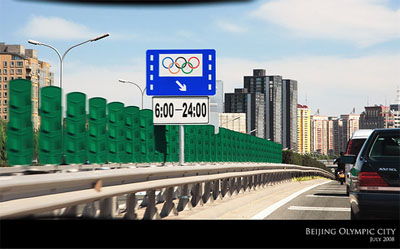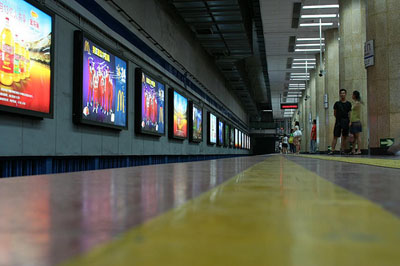Athens spent $15 billion to host the 2004 Olympics. Beijing has spent an unprecedented $26.4 billion on transportation and other infrastructure alone to host this year’s 2008 Summer Games.
In just two
weeks,Beijing, China, will take center stage as the
29th Summer Olympic Games begin in one of the world’s most populated
cities. The Games provide an unique
opportunity for the host city to shine in front of a worldwide audience and
introduce innovative practices that can leave a lasting legacy. As part of the
legacy from the ’08 Games, Beijing hopes to deliver a ‘green’
Olympics. While the athlete’s
victories are captured on camera,
China hopes to implement a
transportation strategy worthy of a gold medal.

Expressway to Olympic
Village, Beijing
In order to accommodate the 300
sporting events, 16,000 athletes and coaches, and more than 9 million
spectators, host cities must enact aggressive transportation plans, with a
considerable transit investment to provide fast, reliable options for the
worldwide event. According to the
Wall
Street Journal, it is estimated the Chinese government spent more than $42
billion to host the Olympic Games. A large majority of that budget was allocated
for transit investments, which included the addition of 10 miles of bus rapid
transit (BRT), purchase of almost 500 electric, hybrid and natural gas-powered
buses and taxis, as well as 2,000 new diesel buses to their existing
routes. The city recently opened a
new $2.3 billion subway line and light rail line to connect the airport and the
city’s central transportation hub.
Olympic ticket holders will be given free rides on all
Beijing
’s public transportation and an
estimated 3.3 million private cars will be given limited access to drive during
the games.

New Subway Station in
Beijing
Chicago, a finalist for the 2016
Olympic Games, may have much of the infrastructure already in place to
accommodate the most prestigious international sporting event in the world. But, it is critical that Illinois
passes a state capital bill that prioritizes
transportation investments, and maintains and upgrades our current system – not
only for the benefit of Olympic athletes and visitors for two weeks in 2016, but
for the benefit of Chicago
and the entire region for the next few decades.
This article was featured in Talking
Transit, MPC’s bi-weekly e-newsletter. To receive the newsletter, email talkingtransit@metroplanning.org
with ‘Subscribe’ in the subject line.